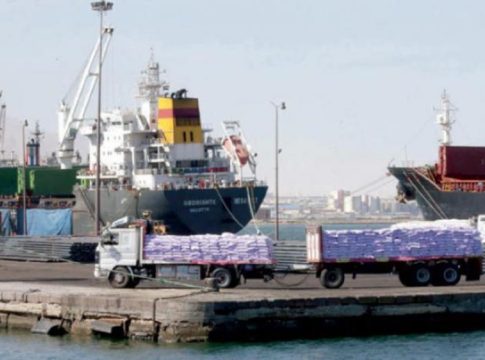Two years of Russian Egyptian governmental negotiations were concluded on May 23 when the Russian and Egyptian ministers of trade signed a 50 year industrial zone agreement as reported by Tass and Reuters. The agreement was a fruit of intergovernmental commission talks that started in February of 2016 after the two governments signed a memorandum of understanding to offer preference and favorable treatment to Russian resident companies in an area of 5.25 million square meters East of Egyptian city Port Said. According to a statement released by the Egyptian ministry of trade the zone is expected to attract around $7 billion worth of investments, with the total Russian investment cost of the first phase amounting to $190 million. The Egyptian minster after which, held a meeting with management of 60 Russian companies that are showing interest in investing in the zone, El-Youm7. In this meeting Tarek Kabil, minister of trade, stated that the current Russian investments in Egypt extent to 66.5 m US dollars in 434 projects in sectors that include tourism, construction and services whereas the Egyptian investments in Russia are in the vicinity of 9 m US dollars in import export services and real estate development sectors. Kabil noted that the companies which participated in the meeting assured their interest in investing in areas that include engineering industries, automobiles, agricultural equipment, heavy industries, railways and new energy, as reported by El-Youm7.
On another front concerning Russian-Egyptian relations, Russia’s foreign minister, Sergey Lavrov, said on May 14th that close cooperation with Egypt on security issues will help restore a direct air link to Egypt’s Red Sea resorts, New York times. The same newspaper had published a commentary on November 2017 titled “In Snub to U.S., Russia and Egypt Move Toward Deal on Air Bases” in which the author David D. Kirkpatrick criticized president Trump’s administration for allowing the Russians to gain more ground in the Middle East as a result of US backing down. He quoted Matthew Spence, a former American deputy assistant secretary of defense for Middle East policy under the Obama administration saying: “Power abhors a vacuum and when the United States pulls back we can’t be under the impression that the world is going to stand by and wait for us.” On the other hand, Lamont Colucci wrote an opinion article titled “Russia Is Cozying Up to Egypt” in which he quoted Gen. Joseph Votel, Centcom’s commander, speaking to the Senate Armed Services Committee in March 2018 saying: “We have seen them (the Russians) do things certainly with our longstanding partner Egypt and others across the region. So, it is my view that they are trying to increase their influence in this critical part of the globe,” yet Coucci contributes this loss of American ground in the Middle East to Obama’s strategy as he said: “This strategic calculus was created by the Obama administration’s withdrawal (perceived and real) from the region. The Russians have utilized their success in Syria to regain certain foreign policy goals left over from Soviet strategic objectives. Some analysts have missed the point by stressing Russia’s more limited current strategic capabilities rather than looking at long-term (and historical) Russian goals and trends.”
An interesting comparison of strategic objectives has been made by Andrew McGregor regarding the mistake of matching current Sisi’s government’s cooperation with Russians to that of Nasser’s era. McGregor dismisses this point of view in an analysis published by The Games Town Foundation and finds 8 common objectives between Sisi’s government and Mohamed Ali (1805–1848, known to most as the founder of Egyptian modern state). These objectives are: Intensifying the purchase and manufacture of arms, expanding naval capacity, conducting military operations abroad to project Egyptian power, consolidating Egypt’s control of the Red Sea region, securing the supply of Nile waters from the south, diversifying international military suppliers and trainers, exterminating the previous regime, and repressing Islamist extremists. He concludes his analysis by saying: “Al-Sisi, like Muhammad ‘Ali, is eager to modernize and increase the capacity of Egypt’s military but appears determined to avoid reliance on either the US or Russia. While Russian approaches will likely not be rebuffed outright, Cairo is making it clear that enhanced cooperation must be consistent with Egypt’s strategic objectives.”


